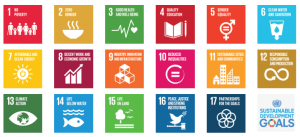“When we enlarge our view of the world, we deepen our understanding of our own lives.”
– UN Messenger of Peace Yo Yo Ma

UN 2016: 17 Goals to Transform Our World
“We the People” for #GlobalGoals PSA
#KnowYourGoals Campaign for the SDGs
WHAT CAN YOU DO – INTERCULTURAL/GLOBAL
– Host or collaborate on an event including food in the spirit of a GLOBAL FEAST or the screening a film on a global issue
– Learn about the Sustainable Development Goals #GlobalGoals
– Learn more about The Enough Project, which builds leverage for peace and justice in Africa and creates real consequences for the perpetrators and facilitators of genocide.
– Learn about, share, and sign your support for The Fuji Declaration, a call to all global citizens to recognize and nurture the full human potential and divine spark within each human spirit.
– If you are an educator, engage students in Oxfam’s Global Citizenship Resources
– Learn about another culture – in our city or across the world
– Share the Global Oneness Project short videos/lesson plans with youth (links below)
– Explore videos and articles (below) and discuss what it means to be a global citizen
– Have your school/your neighborhood/your kids get involved in the global Peace Crane Project Exchange
What Does It Mean to Be a Global Citizen?
U.N. Urged to Put Global Citizenship at Centre of Post-2015 Development Agenda
What Does It Mean To Be A Global Citizen?
THE FUJI DECLARATION
The Fuji Declaration is a call to consciously evolve with others and with nature to bring about a sustainable, flourishing world for all people and future generations. It is a call to all global citizens to recognize and nurture the full human potential and divine spark within each human spirit so as to collectively catalyze a timely shift in the course of human history.
Learn more HERE.
Download the Fuji Declaration 2016
GLOBAL RESOURCES/ARTICLES
Global Oneness Project – Site includes FREE Short films and lesson plans related to international/intercultural topics such as: Recycling for India’s Poor, Meditation for Inmates; Berkley CA’s Karma Kitchen; The People’s Grocery in Oakland, CA; the traditional African philosophy of Ubuntu, and more.
2014 Peace Proposal: Value Creation for Global Change
“Reforming and opening up the inner capacities of our lives can enable effective reform and empowerment on a global scale. This is what we in the SGI call human revolution. Its focus is empowerment that brings forth the limitless possibilities of each individual. The steady accumulation of changes on the individual and community level paves the path for humanity to surmount the common issues we face.”
Global Citizenship Essential In Today’s World
“We could sit all day here and glorify working for peace,” Williams said. “But it’s not a thing that should be glorified; it is a thing that should be done every single day of our lives.”
Global Citizenship Key to World Peace – CLICK HERE
Global Citizenship for World Peace
Daisaku Ikeda: “Education needs to deepen understanding of challenges facing humankind and promote a shared pledge among all people “not to seek one’s happiness and prosperity at the expense of others.”
Global Classrooms Model UN
Offers students valuable insight into the growing influence of globalization.
American Friends Service Committee – International Dialogue & Exchange
Kosmos Journal
Informs, inspires and engages individual and collective participation for global transformation in harmony with all Life.
Importance of Being a Global Citizen in a Multicultural World
“People don’t need to actually travel outside their own country to be Global Citizens; they can do it simply by having a human conscience, and learn about the world from a global perspective as opposed to a single
Seeds of Peace – Seeds of Peace inspires and equips new generations of leaders from regions of conflict with the relationships, understanding, and skills needed to advance lasting peace.
United Nations Global Solutions Blog
Youth as Promoters of Intercultural Understanding
“The Culture of Peace and Non-violence are necessities for the development of people in dignity and as an innate quality of youth…We declare that the democratic citizenship, based in the civic participation and the respect for the human rights, contributes to the development of society and ensuring social peace.”
GLOBAL EFFORTS
The Global Campaign for Peace Education
This campaign seeks to foster a culture of peace in communities around the world. It has two goals: First, to build public awareness and political support for the introduction of peace education into all spheres of education, including non-formal education, in all schools throughout the world. Second, to promote the education of all teachers to teach for peace.
Global Dialogue Project
The Global Dialogue Project is an active collaboration between cities of peace, resulting in peace dialogue, education and communication between leaders as well as citizens and students in each community. Global Dialogue will encourage and facilitate intercultural dialogue on topics relating to peace, and as a result build a greater level of global citizenship
Global Dialogues
Promotes global public health and societal well-being through integrated, youth-driven solutions fueled by creativity and multidisciplinary partnership.
Global Education First – A UN Initiative
The United Nations Secretary-General launched the five-year Global Education First Initiative in 2012 to accelerate progress towards the Education for All goals and the education-related Millennium Development Goals. The Initiative aims to:1 – Rally together a broad spectrum of actors for the final push to 2015; 2 – Put quality, relevant and transformative education at the heart of the social, political and development agendas; 3 – Generate additional and sufficient funding for education through sustained global advocacy efforts.
Global Peace Index
Generated by the Institute for Economics & Peace, a statistical analysis of the state of peace in 162 countries outlining trends in peace and conflict, the economic cost of violence, and an assessment of the attitudes, structures and institutions that sustain peaceful societies.
UNESCO: Intercultural Dialogue
UNESCO is the United Nations Educational, Scientific and Cultural Organization. UNESCO is known as the “intellectual” agency of the United Nations. UNESCO strives to build networks among nations that enable this kind of solidarity, by: mobilizing for education; building intercultural understanding: pursuing scientific cooperation; and, protecting freedom of expression.
Universal Declaration of Cultural Diversity
“In our increasingly diverse societies, it is essential to ensure harmonious interaction among people and groups with plural, varied and dynamic cultural identities as well as their willingness to live together. Policies for the inclusion and participation of all citizens are guarantees of social cohesion, the vitality of civil society and peace. Thus defined, cultural pluralism gives policy expression to the reality of cultural diversity. Indissociable from a democratic framework, cultural pluralism is conducive to cultural exchange and to the flourishing of creative capacities that sustain public life” (Article 2, “From cultural diversity to cultural pluralism”).

